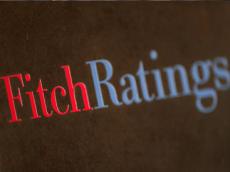Today.Az » Business » Fitch forecasts stable output of Azerbaijani oil
28 March 2014 [12:54] - Today.Az
 By AzerNews
By AzerNews
International Rating Agency Fitch Ratings has affirmed Azerbaijan's long-term foreign and local currency issuer default ratings (IDR) at 'BBB-'.
The agency also affirmed the issue ratings on Azerbaijan's senior unsecured foreign and local currency bonds at 'BBB-', while the country ceiling has been affirmed at 'BBB-' and the short-term foreign currency IDR at 'F3'.
"The affirmation reflects Fitch's expectation that oil production will remain broadly stable for the next five years," the agency said.
"Oil production grew by 0.3 percent in 2013, halting a steep decline from the 2010 peak. New wells and a possible extension of the production sharing agreement between the BP-led consortium and country's government will mitigate natural output decline rates. The natural gas export outlook is also more certain, after stakeholders in the Shah Deniz 2 natural gas project chose an export route to Europe in December, 2013.
The government plans to progressively reduce transfers to the budget from SOFAZ, the State Oil Fund, and generate more non-oil revenue. Oil revenues will still account for around two-thirds of the budget, underscoring high dependence on commodity prices. The 2014 budget calls for spending growth to halve on the previous year to just 5 percent in nominal terms, so that spending as a share of GDP, which reached 39 percent of GDP in 2013, will stop growing."
Azerbaijan issued a debut $1.25bn 10-year sovereign Eurobond in March, establishing a presence in the bond market. Despite the fiscal consolidation under way, the state budget will run a deficit, according to Fitch, while the consolidated budget, including SOFAZ, will be close to balance.
Azerbaijan's sovereign balance sheet is one of the strongest among rated sovereigns and underpins the rating. SOFAZ accumulated $1.7bn in 2013 to reach $35.9bn (49 percent of GDP) by the end of 2013. International reserves of the Central Bank of Azerbaijan (CBA) are a further USD14.4bn. Fitch expects further modest growth in sovereign assets, providing a buffer against oil price or production shocks.
"Fitch estimates the current account surplus at nearly 18 percent of GDP in 2013, driven by a wide trade surplus. The current account surplus will narrow but remain in excess of 10 percent of GDP in 2015," the agency said.
"Fitch expects growth to moderate to 3-4 percent in 2014-2015, as the government seeks to rein in capital spending. Real GDP grew 5.8 percent in 2013 with non-oil growth exceeding 10 percent. Inflation will rise from recent lows after the government raised fuel prices in December. The real effective exchange rate has appreciated owing to Russian rouble and Turkish lira weakness. The Azeri manat remains pegged to the US dollar, backed by large CBA reserves."
The Stable Outlook reflects Fitch's view that upside and downside risks to the rating are balanced. The main positive factors that individually or collectively could lead to rating action are a longer track record of sound management of the public finances in a context of static oil revenues; further growth in sovereign assets, as well as diversification and development of the non-oil economy, improvements in the business environment and other structural indicators.
Negative factors are rapid spending growth that would erode the country's fiscal strength in the medium term; a prolonged period of low oil prices; and a domestic or regional geopolitical shock, such an escalation in hostilities over the disputed region of Nagorno Karabakh.
"Fitch assumes that the price of oil, Azerbaijan's main export and source of budget revenue, will average $105/barrel (Brent) in 2014, and $100/barrel in 2015.
Growth and fiscal projections are sensitive to oil production assumptions. Fitch assumes that oil production stabilizes from 2014-2018, although fluctuations are inevitable.
Fitch assumes that Azerbaijan avoids domestic or regional political shocks, such as no escalation in hostilities with Armenia over Nagorno Karabakh, and domestic political stability is preserved.
Fitch assumes that the government broadly adheres to the 2014 budget," the agency said.
Armenian armed forces have occupied 20 percent of Azerbaijan since 1992, including the Nagorno-Karabakh region and seven surrounding districts. Armenia constantly violates a ceasefire agreement signed with Azerbaijan in 1994 and refuses to implement the U.N. Security Council's four resolutions on the liberation of the Nagorno-Karabakh and the surrounding regions.
|
|